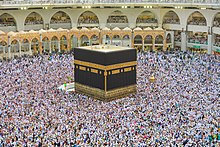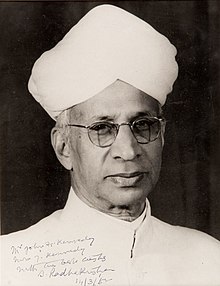Portal:Religion
The Religion Portal
Religion is a range of social-cultural systems, including designated behaviors and practices, morals, beliefs, worldviews, texts, sanctified places, prophecies, ethics, or organizations, that generally relate humanity to supernatural, transcendental, and spiritual elements—although there is no scholarly consensus over what precisely constitutes a religion. Different religions may or may not contain various elements ranging from the divine, sacredness, faith, and a supernatural being or beings. (Full article...)
 Vital article
Vital article
Islam is an Abrahamic monotheistic religion centered on the Quran and the teachings of Muhammad, the religion's founder. Adherents of Islam are called Muslims, who are estimated to number approximately 1.9 billion worldwide and are the world's second-largest religious population after Christians. (Full article...)
 Did you know (auto-generated)
Did you know (auto-generated)
- ... that fictional religions, often described in speculative fiction, have in some cases inspired real religious movements?
- ... that Catherine de Parthenay, a 16th-century Huguenot leader, was a member of "a highly successful network of information" during the French Wars of Religion?
- ... that the Grave with the Hands commemorates a married couple, divided by society and religion, with hands clasped over a cemetery wall after death?
- ... that a religious community is a group of people who practice the same religion, but do not have to live together?
- ... that across his thirty-six collections, fashion designer Alexander McQueen contemplated religion, told fairy tales, and criticized the fashion industry?
- ... that Musa va 'Uj depicts figures from all three Abrahamic religions?
Johannes Kepler (/ˈkɛplər/; German: [joˈhanəs ˈkɛplɐ, -nɛs -] ; 27 December 1571 – 15 November 1630) was a German astronomer, mathematician, astrologer, natural philosopher and writer on music. He is a key figure in the 17th-century Scientific Revolution, best known for his laws of planetary motion, and his books Astronomia nova, Harmonice Mundi, and Epitome Astronomiae Copernicanae, influencing among others Isaac Newton, providing one of the foundations for his theory of universal gravitation. The variety and impact of his work made Kepler one of the founders and fathers of modern astronomy, the scientific method, natural and modern science. He has been described as the "father of science fiction" for his novel Somnium. (Full article...)














































![Image 1 Prometheus tortured by the eagle (black-figure kylix, 560-550 BC) In Greek mythology, Prometheus (/prəˈmiːθiəs/; Ancient Greek: Προμηθεύς, [promɛːtʰéu̯s], possibly meaning "forethought") is one of the Titans and a god of fire. Prometheus is best known for defying the Olympian gods by taking fire from them and giving it to humanity in the form of technology, knowledge and, more generally, civilization. (Full article...)](http://upload.wikimedia.org/wikipedia/en/d/d2/Blank.png)





















